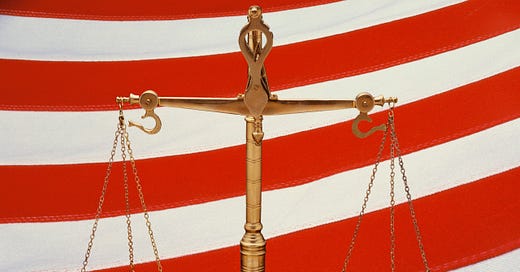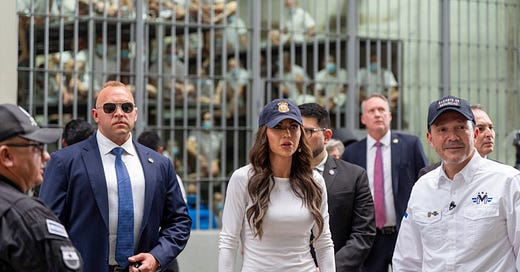
Conspiracists Beware: Post-Election Lies Could Land You in Legal Hot Water
Lessons of the defamation lawsuits that followed the 2020 election.
As Elon Musk seeks to dismantle Twitter’s verification standards and the new crop of pro-Trump anything-goes social media networks like Truth Social and Rumble gain momentum, MAGA media activists may feel emboldened to spread lies about the midterm election even more recklessly than they did in 2020. They ought to consider what’s happening to some of their conspiracy-minded fellow travelers.
At first glance, it might seem as if the most brazen peddlers of Trump-era misinformation haven’t paid any price for their lies. But let’s look at the record. Fox News is facing a pair of billion-dollar defamation suits brought by election-technology firms Dominion Voting Systems and Smartmatic. Fox has also settled with the family of slain Democratic National Committee staffer Seth Rich, putting the network in the same league as InfoWars fabulist Alex Jones, now on the hook to pay Sandy Hook families $965 million in damages. These examples show that defamation laws can be effectively applied to both traditional and nontraditional media figures. And new legal efforts are underway asking the courts to do just that.
Over the past year, the nonprofit Protect Democracy’s Law for Truth project has been successfully advancing libel cases against a number of individuals and organizations responsible for generating and disseminating election-related disinformation. This represents an effort to disrupt the status quo, where defamation challenges are chiefly brought against the big newsrooms at Fox News, CNN, the Washington Post, and the New York Times, while lesser-known media figures who demonstrate total disregard for journalistic standards remain unaccountable.
The explanation for the lopsided pursuit of defamation cases has less to do with matters of justice or any special First Amendment protections than with economics. Libel police, thank goodness, are not roaming the Internet like traffic cops scouting for violations; cases can only be brought by people who are both harmed and have means to litigate. The latter factor is often decisive, since obtaining legal remedies is expensive, grueling, and time-consuming. Hence the imbalance in enforcing defamation laws: Typically, it’s only worthwhile for plaintiffs to sue deep-pocketed corporate entities where a payout is possible.
But could this change? Could there be a future where all media figures, regardless of wealth, partisan bent, or formal training, are expected to abide by the same basic standards of fairness and decency? Where the people behind One America News Network, Gateway Pundit, Project Veritas, and 2000 Mules are held to account for their smears?
Late last month, Protect Democracy lawyers filed suit against the makers and promoters of the conspiracy movie 2000 Mules on behalf of a private citizen in Georgia who was filmed legally depositing 2020 ballots for himself and his family and falsely labeled a “ballot mule”—that is, someone who illegally trafficked ballots as a means to deprive Donald Trump of his re-election victory. The state election board investigated the case and the plaintiff was cleared of wrongdoing. Despite his exoneration, 2000 Mules was released to the public. The complaint details the extensive harassment the plaintiff has suffered as, to this day, his image continues to be used to promote election conspiracies. (See more from Philip Bump here.)
The ramifications of the lies contained in 2000 Mules extend far beyond Georgia’s borders. Since the film was released, it has become an organizing tool for Republican party operatives around the country—a cause to rally around election denialism. Yet, the filmmakers are aware of the potential legal consequences of their spurious claims because, at other times, they’ve taken steps to mitigate their legal exposure.
The companion book to the film, also titled 2000 Mules, credited to conservative writer-turned-conspiracist Dinesh D’Souza, was recalled and delayed due to unspecified “publishing errors.” NPR tracked some of those “errors” the publisher was apparently attempting to squelch: Uncorrected copies of the book accused some nonprofit organizations by name of participating in “ballot trafficking” operations. The book also tried to link Antifa and the Black Lives Matter movement with election fraud.
Still, the film screens on in pure, unredacted form.
The organization True the Vote, which collaborated with D’Souza in making the film, is targeted by Protect Democracy’s suit as well. Unrelatedly, its leaders were jailed last week after a Texas federal judge found them in contempt regarding a different lawsuit brought against them by the election logistics software company Konnech, which is suing the organization for defamation, libel, and slander.
That’s not all. Last month, Arizona Attorney General Mark Brnovich asked that a federal investigation be opened into True the Vote. This is a significant step, as Brnovich did some pandering to the conspiracy crowd in his failed primary bid for the U.S. Senate, but he seems to have had it with the people who advanced election-fraud lies in his state. As he recently told 60 Minutes, “Most of it’s horses**t, and I’ve been trying to scrape it off my shoes for the last year.”
In addition to its suit against 2000 Mules, Protect Democracy has filed suit on behalf of a former Erie, Pennsylvania mail carrier whom Project Veritas accused of illegally backdating ballots to provide votes for Joe Biden. The organization also brought cases on behalf of Fulton County, Georgia, election workers Ruby Freeman and Wandrea “Shaye” Moss against Gateway Pundit and One America News Network (OAN). Freeman and Moss are recognizable defendants. They were accused of illegally smuggling suitcases full of fraudulent ballots into election sites and repeatedly feeding them into voting machines to increase the vote total for Joe Biden. The pair appeared before the House January 6th Committee earlier this year to testify to the harassment they faced as a result of these lies.
Protect Democracy’s suit against OAN has netted results. The network agreed to settle the case last April, and although the exact terms of the settlement are not publicly available, the Wall Street Journal reported that, as a part of the settlement, an OAN presenter went on air to state that Freeman and Moss “did not engage in ballot fraud or criminal misconduct,” and OAN articles referencing the workers were removed from its website.
More significantly, in the wake of Protect Democracy’s lawsuit and other advocacy campaigns against OAN, DirecTV, Verizon, and Frontier have dropped OAN from its distribution channels, severely limiting the reach of its broadcast in the future. (Dominion and Smartmatic have filed their suits against OAN as part of their broader litigation efforts.)
And even though distributors are tight-lipped about their decision to nix OAN, it’s no great leap to extrapolate from the timing, and from Fox News’s decision to terminate longtime Fox Business host Lou Dobbs, that these combined legal efforts already have had an impact.
Smartmatic was the first to drop a billion-dollar lawsuit on Fox News, on February 4, 2021. It specifically listed Dobbs by name. The next day, Fox News axed Dobbs, perhaps hoping to prevent the suit from going forward. Executives maintained it was simply a part of the “programming changes” that “Fox News media regularly considers.”
Along those same lines, Protect Democracy filed its suit against OAN on December 23, 2021. Not long after the holidays, DirectTV became the first distributor to sever ties with OAN. Like Fox News, DirecTV gave a similarly vague, business-as-usual statement to the press: “We informed Herring Networks [owner of OAN] that, following a routine internal review, we do not plan to enter into a new contract when our current agreement expires,” the company said.
In the meantime, Protect Democracy’s other lawsuits are moving forward. Former Trump campaign lawyer Rudy Giuliani was included in Protect Democracy’s OAN lawsuit, and last month, a federal judge summarily rejected Giuliani’s requests for a motion to dismiss. And the suit against Project Veritas cleared a motion to dismiss in July.
Despite these legal storms, most of the 2020 election conspiracists have continued to press on with their efforts. Their political conspiracies did not die quietly at the end of the presidential election cycle. They stumble on like zombies wrecking anything in their path. Two years after Donald Trump’s defeat, Republican officials and candidates continue to use his election conspiracies as the basis for their campaigns, investigations, audits, and new laws—even though the claims undergirding those actions were never established and rejected by the courts dozens of times.
To that end, Trump appeared on D’Souza’s podcast last week, in an episode billed as a “2000 Mules Special With Donald Trump.” Predictably, the ex-president and his pardonee regurgitated disproven claims from the film and movie, serving them up for the masses to feast upon once again.
As distasteful as it is, they are incentivized to do so because, for the being, the self-reinforcing triangle of doom between media conspiracy theorists like D’Souza, the conservative base, and the titular head of the GOP, Trump, remains profitable and unbroken. The penalties for trafficking in these lies simply have not yet been stiff enough to deter those who so easily profit from them, either in the form of economic or political gain. Someone like Sidney “Kraken” Powell can have her law license taken away and receive a fine, but a $175,250 penalty is pennies considering she raised more than $14 million in her crusade to flip the election for Trump.
But if Protect Democracy is successful, all that could change.
What would an appropriate penalty capable of deterring bad actors look like, exactly? Protect Democracy’s Ian Bassin is comfortable leaving that decision entirely up to the courts. “Whatever the courts ultimately determine is the right amount to compensate those who have been injured for their suffering and deter those who are committing these injuries from doing it again, that is what they should be forced to pay,” Bassin told me. “No more and no less.”
Let Protect Democracy’s defamation cases serve as a warning that consequences, whatever they may be, could be coming. At last.











